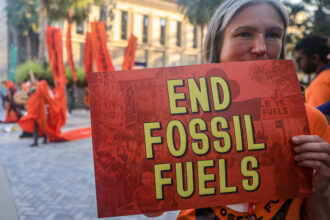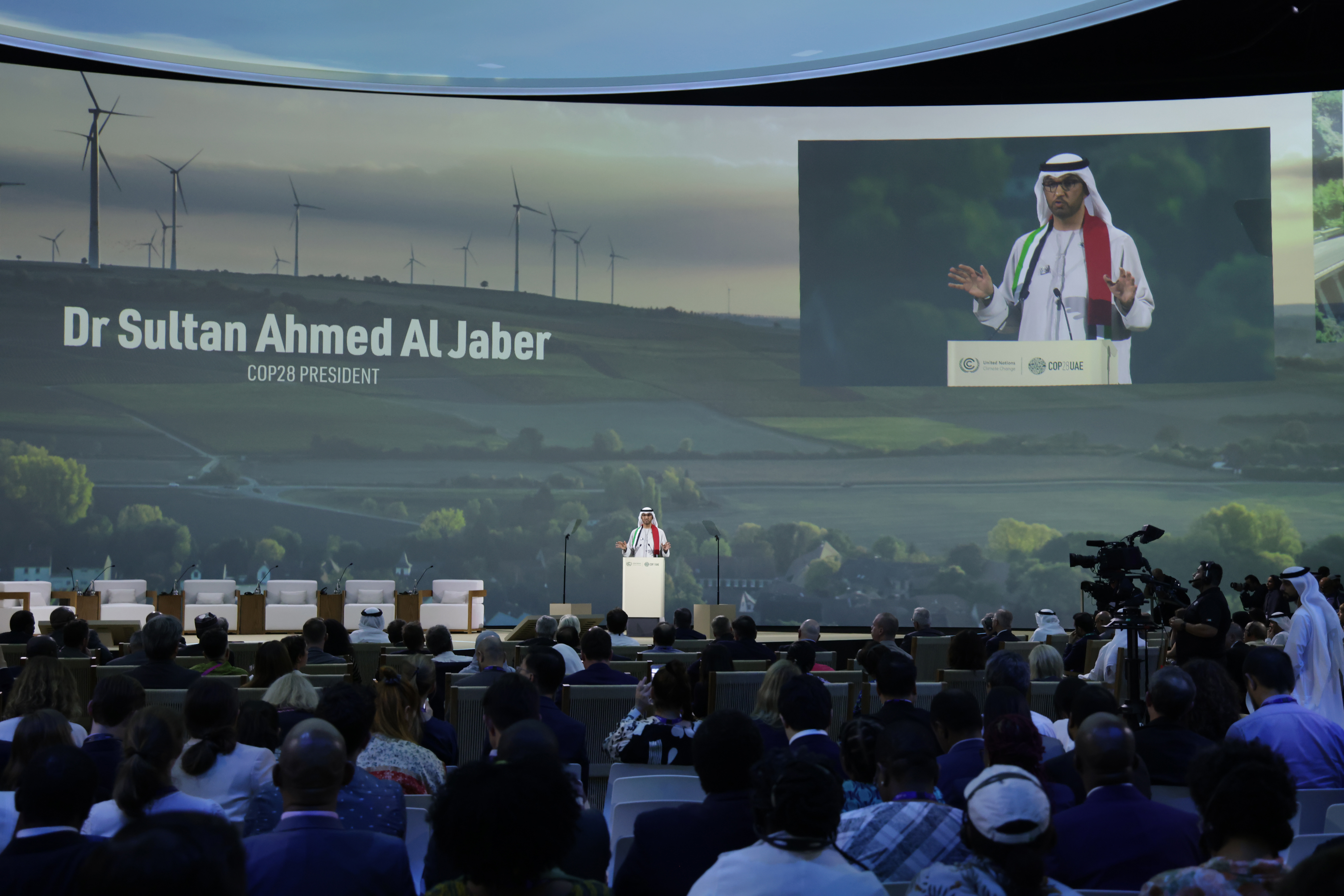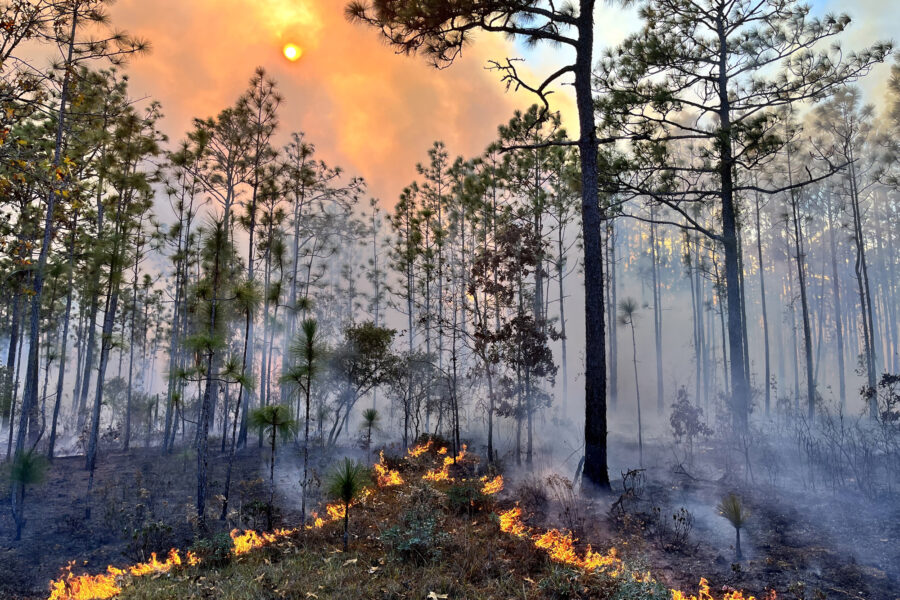DUBAI, United Arab Emirates—As negotiators at COP28 debate which verbs in the final documents would indicate the correct level of urgency, scientists at the global talks delivered a simple, dire message: Act now, or trigger climate tipping points with serious risks to the lives and livelihoods of billions of people.
“We’re clearly in the danger zone and we’ve left it far too late for incremental action,” said Tim Lenton, a University of Exeter climate researcher and one of the co-authors of a new report detailing those dangers.
As the planet’s temperature increase nears 1.5 degrees Celsius above the pre-industrial average, the already occurring meltdown of large ice sheets will become irreversible and lead to centuries of sea level rise, coral reefs and their life-sustaining fisheries will disappear and crucial ocean currents will slow or stop, dramatically shifting rainfall and drought patterns. Societal impacts, the scientists said, would include mass displacement and migration, political instability and financial collapse.
“These are tipping points of a magnitude that has never been faced before by humanity,” Lenton said, urging the negotiators to consider those impacts and to spell them out for the public in the documents to be published at the end of COP28.
A tipping point is when a small change makes a big difference to a system by triggering self-propelling change and amplifying feedbacks within that system, Lenton said.
“Basically, those risks have been increasing dramatically over time,” he said. ”Each time the [Intergovernmental Panel on Climate Change] has reassessed the likelihood of what it used to call large-scale discontinuities in the climate system, it has lowered the temperature at which they become a risk.”
“The impacts will be felt on a global scale,” he said, “including the loss of capacity to grow major staple crops. Global governance is clearly failing to minimize those threats. Even if we have more decisive action, we have to accept that some of these points may be unavoidable. But mitigating the risks and the damages they cause is still possible by reducing the vulnerability of people to those impacts.”
A stream of similar studies and reports the last few years has clearly raised awareness of the risks. More than 100 countries at the talks are now pushing for a strong agreement that would put the world on a path to phasing out fossil fuels. There are concurrent efforts to build support for a fossil fuel non-proliferation treaty, now supported by 11 countries, as well as the European Union Parliament, the World Health Organization and many cities and other subnational governments.
As the final phase of the talks started Friday, the United Nations Framework Convention on Climate Change executive secretary Simon Stiell urged the 198 countries to aim high, especially with regard to language on a fossil fuel phaseout.
“There are low, middle, and high ambition options on many issues,” he said. “If we want to save lives now, and keep 1.5 within reach, the highest ambition COP outcomes must stay front and center in these negotiations. So I urge negotiators to start with the highest ambition outcome and for them to ask, ‘How do we get there?’”
Those high ambitions come with high hurdles. During a Friday morning session, a negotiator from Saudi Arabia once again indicated that his country would not support a clear, direct statement on phasing out fossil fuels because the Paris Agreement only talks about emissions, and not the source of those emissions. Under the current negotiation rules, all language in the conference documents must be approved by consensus, so any one country can block language it doesn’t like.
Saudi Arabia is not alone, according to Natalie Jones, who tracks the climate talks as an observer for the nonprofit International Institute for Sustainable Development. In previous negotiating sessions, Jones posted on social media, China and the Arab Group wanted to delete all the text relating to phasing out fossil fuels, while Russia and Iraq proposed adding text on “natural gas as a transition fuel.” Russia is now on record as opposing the widely supported target to triple global renewable energy production by 2030.
China also proposed language on “recognizing the important role of FFs in facilitating the energy transition while ensuring energy security,” Jones said. “Energy security,” she added, is understood as code for building new long-lived gas infrastructure that is not aligned with pathways to limit warming close to 1.5 degrees Celsius.
Good Tips
But the tipping points report, authored by an international team of 200 scientists, also discusses economic and social tipping points that could “enable positive transformative changes” that are now desired by a majority of countries, said co-author Johan Rockström, director of the Potsdam Institute for Climate Impact Research.
“We’re already seeing it in the energy system,” he said. “This is critical, it should speed the phase-out of fossil fuels and the shift to renewable energy. I’m particularly interested in the large-scale rollout of sustainable, affordable public transport systems. We need to think not just of the energy energy system but transport systems,” he said.
The global food system is another critical area that needs transformational change, he added.
This story is funded by readers like you.
Our nonprofit newsroom provides award-winning climate coverage free of charge and advertising. We rely on donations from readers like you to keep going. Please donate now to support our work.
Donate Now“We’ve known for a very long time that we need to reconfigure it, not just from a climate perspective, but also from the land use, biodiversity and oceans perspective.”
Rockstöm said the financial sector is another important system where positive tipping points are possible.
“If we think of moving capital investments away from nature-eroding activities, or turning harmful processes into more nature-positive restorative processes, I think that’s where we have a lot of potential for cascading positive tipping points,” he said. “It’s definitely a chance to actually see the kind of transformative change that we need.”
Just like Earth system tipping points, societal tipping points can also combine and accelerate each other, added co-author Steve Smith, a tipping points research fellow at the University of Exeter.
“For example, as we cross the tipping point that sees electric vehicles become the dominant form of road transport, battery technology continues to get better and cheaper,” he said. “That
could trigger another positive tipping point in the use of batteries for storing renewable energy, reinforcing another in the use of heat pumps in our homes, and so on.”
Smith said many parts of society have the potential to be tipped in this way, including politics, social norms and mindsets.
“Human history is full of examples of abrupt social and technological change,” he said. “Learning from these examples, we must switch our focus from incremental change to transformative action to tip the odds in our favor.”













